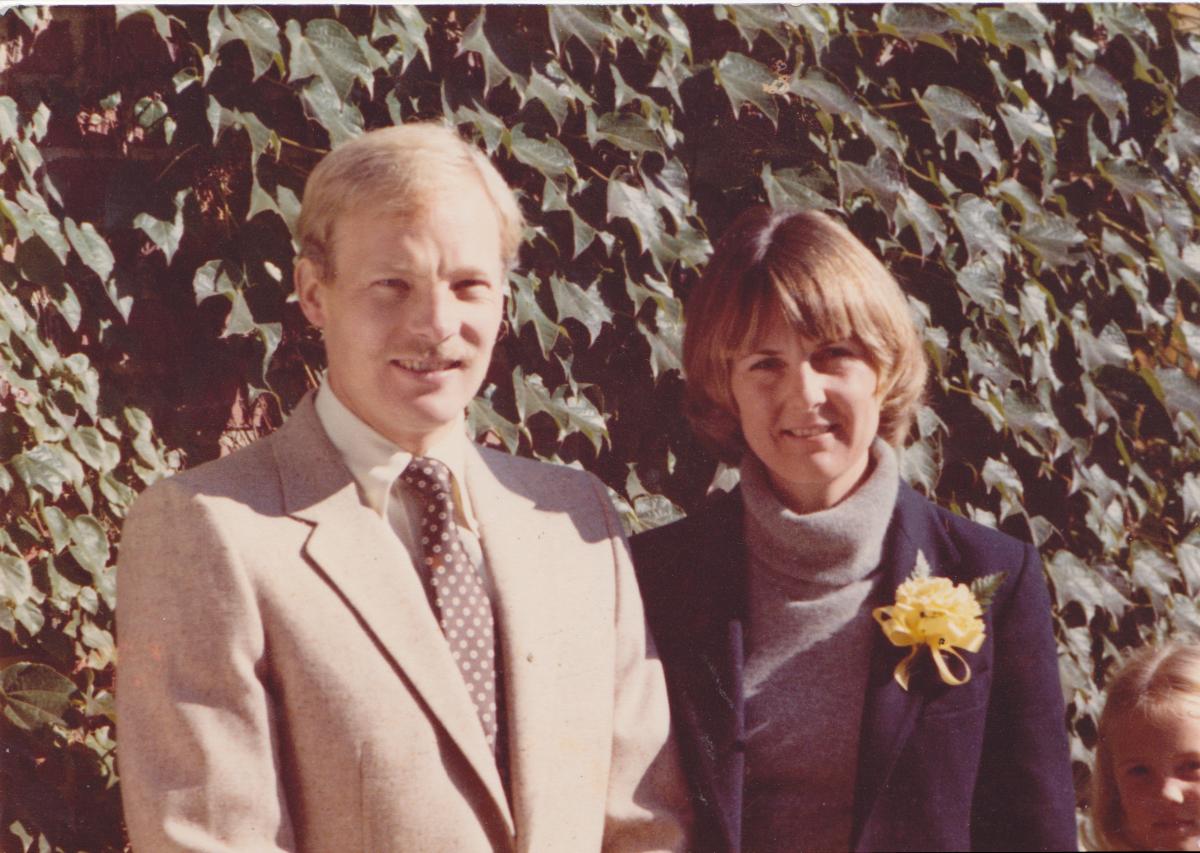I’ve been married to the same woman for 46 years, and I can say unequivocally that I totally trust her. I trust her to do the right thing, I trust her to not throw me the under the bus (even though I have given her many opportunities), and I trust her to stand up for people in need of special help. When she makes a statement, I know it is based on sound research; she is incredibly well-informed and well-read. When she says she is going to do something, I have total confidence that it will get done on time . . . or ahead of time. Because she is so caring and curious, many friends see her as a strengthening angel. To top it all off, she is also extremely unselfish; she would much prefer to attend to others than draw attention to herself. I wish I could say all those things about myself.

Does she sometimes tell little white lies? Of course. Is she self-disclosing and completely open about her thoughts and feelings? No. Does she take every opportunity to nakedly reveal her history? Absolutely not. But I never have any doubts about her intentions and her integrity. She is entirely trustworthy, and I am incredibly lucky she has put up with me for so long.
To trust someone so deeply on a personal level is a huge gift. This type of trust depends on four factors: credibility, reliability, personal connection, and humility.
Credibility is about words. If someone says something, you can bank on it being true. Reliability is about action. A person is reliable when he does what he says he is going to do when he says he is going to do it. Personal connection is the ability to relate to someone on levels deep below the surface and high above the mundane. Its foundations are empathy and transparency, and it’s built through meaningful conversations. Humility is about attitude and service-orientation. Instead of self promoting and self-aggrandizing, a humble person is inclusive of others. While these definitions may sound simple enough, think about how many people you know who over-promise and under-deliver (or under-promise and over-deliver), how many people seem to think exclusively about how to serve themselves, and how many fleeting and insubstantial connections we make in our lifetimes.
In my experience as an executive coach, my success depends upon my clients’ belief that our conversations are completely confidential, and that I will be brutally honest about their strengths and weaknesses. They also need to experience being heard and understood. If my clients trust my words, behaviors, intentions and orientation, they are more likely to take action on suggestions for development.
The second type of trust is organizational. Not all businesses and not-for profits inspire trust. In 1988, Barry Cohen and I co-authored a book on Ethical Leadership: Rebuilding Trust in Corporations. The principles we discussed then are even more relevant today given the inequality, corruption, and shameless greed we have been witnessing.
For many people today, the staggering examples of wrongdoing have shaken the trust in our public institutions and the people who run them. We live in a social environment that challenges ethical behavior. Americans value individualism and economic success more than interdependence and spiritual growth. Self-interest is a virtue. Short-term profit and quarterly results take precedence over the long haul. Revenues trump relationships.

By contrast, ethical leaders build trust by putting others above themselves and looking out for the greater good. For over 30 years I have explored the principles of ethical leadership and observed the practices of corporate leaders. I have worked in the trenches where decisions get made. In my interactions with thousands of leaders over time, I have found the vast majority to be good, honest people who take care to do the right thing. There are those, of course, who get greedy, are driven by self-interest and insufferable narcissism. These few are capable of creating disasters and damaging trust.
Building institutional trust requires acting congruently with vision, mission, and value statements and establishing “grow-grow” relationships. People typically trust organizations whose values are aligned with their own. And employees perform best when they feel there is a good cultural fit. Building trust also requires experience and the ability to lead change. Finally, organizations build trust among their stakeholders when they demonstrate a strong and genuine commitment to people, customers, and communities. Envisioning what is possible, aspiring to a higher purpose than profit, and articulating core values serve as guideposts for making ethical decisions and restoring trust.
I was once asked to design and deliver a training program to build trust in a large, multi-national bank. The executives asked me to train mid-managers on the principles of ethical leadership. After running a few programs, I learned that the executives were lying to employees, continuing to engage in corrupt practices, and refusing to participate themselves in this trust building project. The bank leaders did not have the capability or commitment to lead change. Thus, employees rebelled and I walked away from the gig.
Fortunately, the banking experience has not been the norm in my career. I have been lucky enough to work with highly ethical leaders who were genuinely concerned about the well-being of their employees, their customers, and their communities. One shining example of a high-integrity executive is Russ Campanello, the head of Human Resources at iRobot. Over the past 25 years, I have worked with Russ in several corporations. Not only does he excel on all the factors of establishing personal trust, he is also constantly vigilant that his respective organizations act in alignment with their vision and values. He has the leadership capabilities required to make and influence the right decisions, and he has a strong commitment to a higher purpose. To me, he sets the standard for trustworthy leadership.
The third type of trust is governmental. What would it take to re-build trust in our government? Whew! I know—this is dangerous territory, but here goes.

In November 2015, The Pew Research Center published a report on trust in government from 1958 to 2015. The findings show a precipitous decline in trust over the past 50 plus years. The researchers found that only 19% of Americans today can trust the government to do what is right “just about always” (3%) or most of the time (16%). This is a shocking result particularly when the highest level in the survey is not “always” but “just about always.” In 1958, over 70% of the population trusted the government to do what is right just about always or most of the time. What happened?
The erosion of public trust in government began in the 1960s. The Vietnam War (or more accurately, the American War in Vietnam), civil unrest, and the Watergate scandal all contributed to the decline. By the end of the 1970’s trust had dropped from 77% to 25%. The wars in Iraq, Afghanistan, Libya, and Syria added fuel to the fire and, alas, here we are 19%.
The bitter debates over the debt ceiling and the Affordable Care Act have further eroded what little trust remained. Whereas, the “formulas” for building personal and organizational trust are fairly straightforward, the path to restoring trust in government is far more difficult and complex.
To me the divisiveness in Congress and the proliferation of shameless narratives that create a set of beliefs about the caricature of a candidate instead of the character of a person are the biggest factors in the abysmally low levels of trust in government. The Hillary e-mail “scandal” is a good example of a story that supports a belief vs. evidence that reveals the truth.
The fact appears to be that Hillary sent approximately 60,000 e-mails from her private account when she was Secretary of State, 30,000 of which she turned over to the Justice Department. There are two problems with the narrative that has been created to support the belief that Hillary is crooked. First, while there are State Department guidelines prohibiting personal e-mail accounts, Colin Powell and other government officials had done the same in the past. It doesn’t make it right, but the decision was not unprecedented. Second, while many of the e-mails contained classified information, only three were marked confidential at the time she sent them. When I was in military intelligence, I had Top Secret clearance and had access to highly classified material. What I discovered was that I learned more from reading the NY times than I did from reading intelligence reports. Most information in the government is over-classified.
The story the Republicans are spreading is totally contrived. There is a shred of truth in their claims, but an abundance of fabrication and exaggeration. The question is, what needs to happen to restore trust in government?
First, legislators on both sides of the aisle need to be open to finding common ground. Surely there are issues on which Republicans and Democrats share the same interests and goals for the greater good. Education would be a good place to start. Reasonable gun control may represent another opportunity. Immigration, climate change, and health care may be more difficult because of ideological rigidity.
Essentially, building each of the three types of trust requires a commitment to a higher purpose and the greater good; the capability to collaborate constructively; and a culture that rewards honesty, fairness, and decency. So, do I think my wife should be the next POTUS? Absolutely not! She is highly trustworthy but she is not qualified for the job. Do I think Hillary should be the next President? Absolutely yes! She may have told some little white lies in her past, she may have made some big mistakes, and she is not particularly self-revealing about her history; but I trust her to be an excellent President on a personal level, an organizational level, and on a governmental policy level
The question for all of us is: what can I do in my own life to build trust in my personal relationships, my organizational affiliations, and my local, state, and federal government? We all know people who do all three types of trust well. May we emulate the exemplars instead of wading with the weasels.
Also published on Medium.




This is a beautiful piece Ricky! How do we get this onto the national airwaves? Thank you once again for being you-you and Bobbit, along with Cathy are indeed my strengthening Angels! RonnyDonny